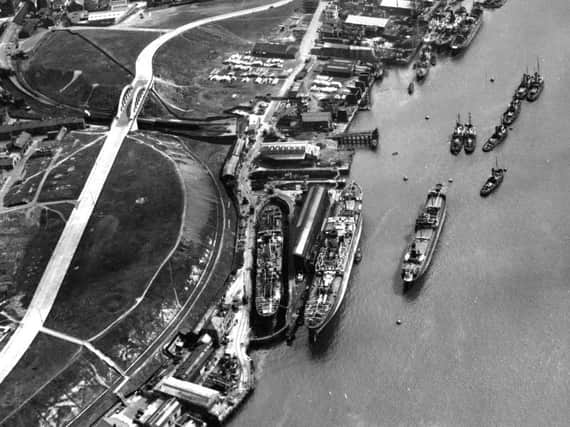Tribute to South Tyneside war hero dock workers


Today, thanks to the Port Of Tyne, which proceeded the commission, we learn more about what life was like locally on the home front, as dozens of its workers were overseas fighting the Germans.
Details taken from commission board minutes reveal that: “Soon after the outbreak of war, the general manager’s office voluntarily organised a monthly subscription.
Advertisement
Hide AdAdvertisement
Hide Ad“The engineer’s office instituted a similar scheme, and at the end of August 1914, a sum of £16 18s 0d was sent to the Newcastle-upon-Tyne War Fund to help families less fortunate, subscribing to local relief funds.”
The records show that in the first seven months of 1914, before war broke out, the commissioners reported a significant increase in revenue compared to the same period the previous year.
A Port Of Tyne spokeswoman said:“In the first five months following the war, revenues fell by 33% and exports of coal and coke breeze fell by 56% in the immediate months following the war.
“By the end of 1914, four per cent of the commissioner’s workforce had left to fight for their country, and the impact of agreeing to pay their wages was starting to affect the port’s revenues, but the commissioners were steadfast that this would, without hesitation, continue for as long as the war continued.”
Advertisement
Hide AdAdvertisement
Hide AdThe commissioners considered their position at the end of 1914 and decided that, with careful cost-saving and letting out of what resources they could, they saw no reason why they could not continue to “pay their own” if the war was to continue into 1915.
Whereas other ports hiked up charges, the commissioners of the Port of Tyne were proud to say that “there was no reason to suppose that they should have to make any increases at all”.
“In the board meeting of April 1915, the commissioners stated that, ‘if hence-forward any future generation was to investigate their actions in 1915, it would be something to their credit that they were able to pass through the biggest war that the world has ever seen, and do so without increasing charges’.”
“The commissioners also applauded their staff during a period of great strain, owing not only to the diminished workforce, but because of an immense amount of work thrown on them by the War Office and the Admiralty.
Advertisement
Hide AdAdvertisement
Hide AdThe chairman said: “I dare say it would be impossible to find a body of men more determined, more active, more zealous in the work they do for the commission than those gentlemen who constitute the staff of the Tyne Improvement Commission. I sincerely hope that our position may be taken as a sample of this country, and we need not fear the efforts of our enemy.”
When the war ended, a total of 56 men from the Tyne Improvement Commission had lain down their lives for king and country. “In memory of their great sacrifice a memorial was erected and displayed in Bewick House. The inscription reads: ‘In honoured memory of the men in the service of the commission who gave their lives in the Great War 1914-1919, erected by their colleagues.”